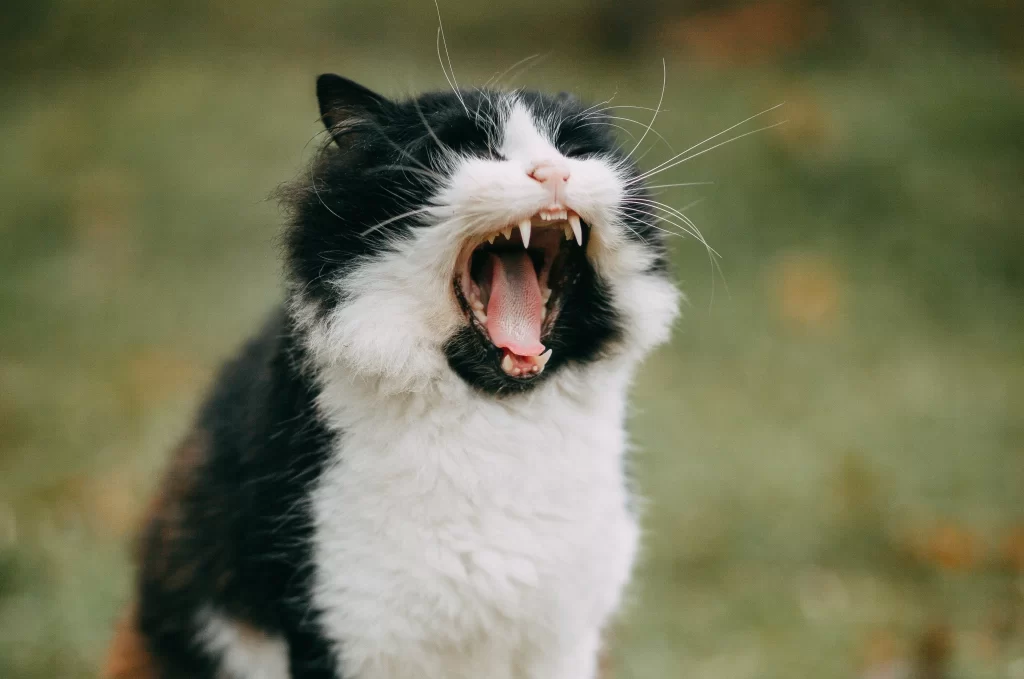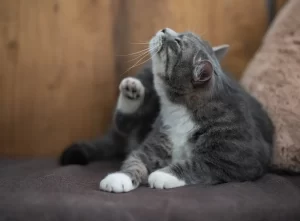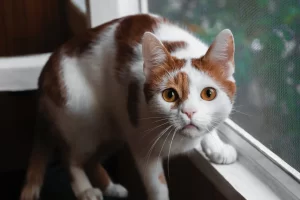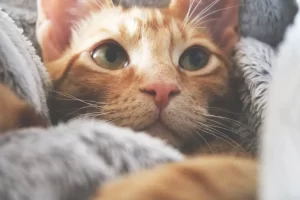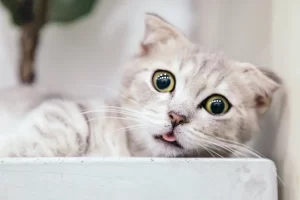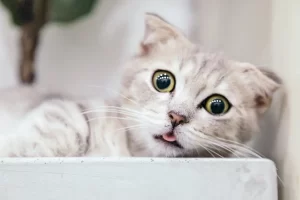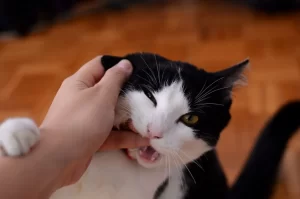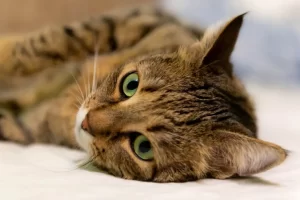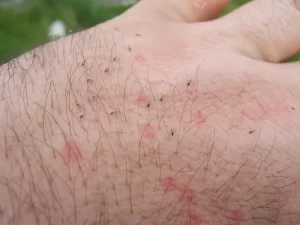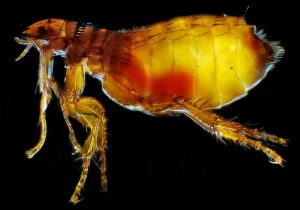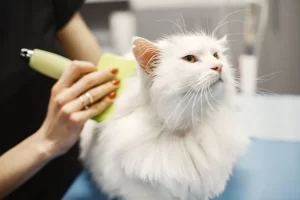Roundworms in cat vomit are a common parasitic issue that can affect cats of all ages. These worms, known as Toxocara cati, are intestinal parasites that can infest a cat’s digestive tract, causing various health issues. One of the visible signs of roundworm infestation in cats is the presence of worms or worm fragments in their vomit. Understanding the causes, symptoms, risks, and management of roundworms in cat vomit is crucial for cat owners to ensure the health and well-being of their feline companions. In this article, we will explore various topics, including how cats can become infected, signs and symptoms, health risks, treatment options, management strategies, and frequently asked questions related to this issue.
Table of Contents
ToggleUnderstanding Roundworms in Cats: A Brief Overview of Lifecycle and Infection
Roundworms are a type of intestinal parasite that commonly infect cats. They are known scientifically as Toxocara cati, and they belong to the family Ascarididae. Roundworms are cylindrical in shape, and they can grow up to several inches in length. They have a white or pale yellow color and are often found in the intestines of cats.
The lifecycle of roundworms starts when adult worms in the intestines of cats lay eggs, which are then passed out in the feces of the infected cat. These eggs can contaminate the environment, such as litter boxes, soil, and grass, and can survive for extended periods of time. Cats can become infected with roundworms by ingesting the eggs through various routes, including grooming themselves or eating infected prey, such as rodents or birds.
Once ingested, the roundworm eggs hatch in the cat’s stomach, and the larvae migrate through the digestive tract and other organs, such as the liver and lungs. Eventually, the larvae return to the intestines, where they mature into adult worms and start laying eggs, completing the lifecycle.
Roundworms can pose health risks to cats, as they can cause gastrointestinal issues, nutrient deficiencies, and other complications. Therefore, it is important for cat owners to be aware of roundworms, their lifecycle, and how they can infect cats in order to take appropriate preventive measures and seek veterinary care if their cat shows signs of roundworm infestation.
Cat Vomiting: Causes and Importance of Identifying Roundworms as a Common Factor
Cat vomiting can have various causes, and ingestion of roundworms is one of them (See all the different types of cat vomits). When cats are infected with roundworms, the adult worms reside in their intestines and lay eggs. These eggs can be passed out in the feces, and when a cat grooms themselves or ingests contaminated prey, they can swallow roundworm eggs. These eggs hatch into larvae in the cat’s stomach, and the larvae can migrate through the digestive tract, potentially causing irritation and inflammation, which can trigger vomiting.
In some cases, the adult roundworms themselves may also be vomited up by the cat. The worms, which are long and cylindrical, can sometimes be visible in the vomit or may be partially digested and appear as spaghetti-like strands. This can be alarming to cat owners and may be an indication of a heavy roundworm infestation.
It is important to identify the cause of vomiting in cats, including the possibility of roundworm infestation, as vomiting can be a symptom of various underlying health issues. In addition to roundworms, other common causes of vomiting in cats may include dietary indiscretion, hairballs, gastrointestinal infections, foreign object ingestion, and other parasitic infections. Accurate identification of the cause of vomiting can guide appropriate treatment and management strategies, including deworming medications if roundworms are suspected or confirmed.
Roundworm Infestation in Cats: Understanding the Modes of Infection and Transmission
Cats can become infected with roundworms, specifically Toxocara cati, through ingestion of roundworm eggs in contaminated environments or through infected prey. Here are two common ways cats can become infected with roundworms:
- Ingestion of roundworm eggs in contaminated environments: Roundworm eggs are passed in the feces of infected cats and can contaminate the environment, such as litter boxes, soil, and grass. Cats can ingest these eggs when they groom themselves or when they eat food, water, or soil that has been contaminated with infected feces. This can happen indoors or outdoors, and even indoor cats are not completely immune to roundworm infestation if they are exposed to contaminated environments.
- Ingestion of infected prey: Cats are natural hunters and may catch and eat prey, such as rodents or birds, that are infected with roundworms. The roundworm eggs or larvae present in the prey’s tissues can then be ingested by the cat, leading to infestation.
Once the roundworm eggs are ingested, they hatch into larvae in the cat’s stomach, and the larvae can then migrate through the digestive tract and other organs, such as the liver and lungs, before returning to the intestines and maturing into adult worms. The adult worms then start laying eggs, completing the lifecycle and perpetuating the infestation.
Signs and Symptoms of Roundworm Infestation in Cats: Vomiting, Diarrhea, Poor Coat Condition, and More
Roundworm infestation in cats can manifest with a variety of clinical signs and symptoms. Here are some common signs that may indicate a roundworm infestation in cats:
- Vomiting: Cats infected with roundworms may vomit, sometimes with the presence of roundworms or worm segments in the vomit. Vomiting may be intermittent or frequent, and it can be associated with other gastrointestinal issues, such as abdominal discomfort or irritation caused by the worms.
- Diarrhea: Cats with roundworms may have diarrhea, which can be loose, watery, or bloody. The presence of roundworms in the intestines can disrupt normal digestion and bowel movements, leading to diarrhea.
- Poor coat condition: Roundworm infestation can affect the overall health and condition of a cat’s coat. Cats with roundworms may have a dull, unkempt coat, and their fur may be rough, dry, or matted. This can be due to nutrient deficiencies caused by the roundworms absorbing essential nutrients from the cat’s intestines.
- Pot-bellied appearance: Roundworms can cause a pot-bellied or bloated appearance in cats, especially in kittens or cats with heavy infestations. This can be due to the accumulation of roundworms in the intestines, leading to distension of the abdomen.
- Weight loss: Cats with roundworms may experience weight loss despite having a good appetite. The worms can compete with the cat for nutrients, leading to malnutrition and weight loss over time.
- Lethargy and weakness: Roundworm infestation can cause general weakness and lethargy in cats, as the worms can sap their energy and cause overall discomfort.
- Coughing: In some cases, if the roundworm larvae migrate to the lungs, cats may develop a cough as the larvae irritate the respiratory tract.
Remember that not all cats with roundworms will show clinical signs, especially in mild infestations. Therefore, regular fecal examinations by a veterinarian are essential for accurate diagnosis. If a cat is showing any of the signs mentioned above or if a roundworm infestation is suspected, it’s crucial to consult with a veterinarian promptly for proper diagnosis and treatment.
Health Risks of Roundworm Infestation in Cats: Nutrient Deficiencies, Gastrointestinal Blockage, and Transmission to Humans
Roundworm infestation in cats can pose several health risks, both to the infected cats and to humans who may come into contact with infected cats or their environment. Here are some potential health risks associated with roundworm infestation in cats:
- Nutrient deficiencies: Roundworms can compete with the cat for essential nutrients in the intestines, leading to nutrient deficiencies. This can result in poor growth, weight loss, and overall poor health, especially in young kittens. Nutrient deficiencies can weaken the cat’s immune system and make them more susceptible to other diseases.
- Gastrointestinal blockage: In heavy infestations, roundworms can form a tangled mass or ball of worms in the cat’s intestines, leading to blockage or obstruction. This can cause severe abdominal pain, vomiting, and potentially life-threatening complications that may require surgical intervention.
- Migration to organs: Roundworm larvae have the ability to migrate to other organs in the cat’s body, such as the liver, lungs, and eyes, causing inflammation and damage. This can result in respiratory issues, liver damage, and other organ-related complications.
- Transmission to humans: Roundworms can pose a zoonotic risk, which means they can be transmitted from infected cats to humans. This can happen through direct contact with infected feces or contaminated environments, ingestion of roundworm eggs, or accidental ingestion of infected roundworm larvae. In humans, roundworm infestation can cause a condition called visceral larva migrans, where the larvae migrate through organs and tissues, leading to inflammation, organ damage, and potential systemic complications.
Treatment of Roundworm in Cats Vomit
Treatment of roundworm infestation in cats typically involves the use of deworming medications that are effective against roundworms. Here are some commonly used treatment options:
- Prescription deworming medications: There are several prescription deworming medications that are specifically formulated to target roundworms in cats. These medications contain active ingredients such as pyrantel pamoate, fenbendazole, or milbemycin oxime, which work to paralyze and kill the roundworms, allowing them to be expelled from the cat’s body through feces. Examples of prescription deworming medications for cats include Drontal, Panacur, and Milbemax, which are available in various formulations such as tablets, suspensions, or topical spot-ons.
- Over-the-counter deworming medications: There are also some over-the-counter deworming medications that can be used for treating roundworm infestations in cats. These medications usually contain active ingredients such as pyrantel pamoate or piperazine, which are effective against roundworms. However, it’s important to note that over-the-counter medications may not always be as effective or safe as prescription medications, and their use should be discussed with a veterinarian to ensure appropriate dosing and safety.
- Combination dewormers: Some deworming medications for cats may also be formulated as combination products, targeting multiple types of worms, including roundworms. These medications may contain additional active ingredients such as praziquantel or febantel, which are effective against other types of intestinal parasites commonly found in cats, such as tapeworms or hookworms. Examples of combination dewormers for cats include Profender and Advantage Multi.
Note that the choice of deworming medication and dosage may depend on factors such as the severity of the roundworm infestation, the age and weight of the cat, and any underlying health conditions the cat may have. Therefore, it’s crucial to consult with a veterinarian for accurate diagnosis and appropriate treatment recommendation tailored to your cat’s specific needs.
Management of Cat Vomiting Due to Roundworms
Management of cat vomiting due to roundworms typically involves a multi-faceted approach that includes addressing the underlying roundworm infestation, providing supportive care to the cat, making dietary changes, and managing potential complications. Here are some specific management strategies:
- Deworming medication: As discussed earlier, deworming medication is the primary treatment for roundworm infestations in cats. Administration of an appropriate deworming medication, as prescribed by a veterinarian, can help eliminate the roundworms from the cat’s gastrointestinal tract and reduce vomiting associated with the infestation.
- Supportive care: Cats that are vomiting due to roundworms may require supportive care to help manage their symptoms. This may include providing intravenous fluids to rehydrate the cat, anti-emetics to control vomiting, and other supportive measures such as warmth and comfort to help the cat recover.
- Dietary changes: Cats with roundworm infestations may benefit from dietary changes. Your veterinarian may recommend a specific diet that is easily digestible and provides optimal nutrition to help support the cat’s recovery. Avoiding feeding the cat raw or undercooked meat, which may be a potential source of roundworm infection, is also important.
- Monitoring for complications: Roundworm infestations can sometimes lead to complications such as gastrointestinal blockage, especially in severe cases or in kittens. Monitoring the cat for signs of complications such as persistent vomiting, abdominal pain, or lack of appetite, and seeking veterinary care promptly if any of these signs occur, is crucial to prevent further complications.
- Environmental hygiene: It’s important to thoroughly clean and sanitize the cat’s environment, including litter boxes, bedding, and any areas where the cat spends time, to reduce the risk of re-infestation. Regularly removing feces from the environment and practicing good hygiene measures, such as washing hands thoroughly after handling the cat or cleaning the litter box, can also help prevent the transmission of roundworms to other pets or humans.
Will Vomiting Remove All the Worms?
No, vomiting is not a reliable method to remove all the roundworms from a cat’s digestive tract. While vomiting may expel some roundworms from the stomach, it is unlikely to remove all of them, as the worms may be present in other parts of the digestive tract, such as the intestines.
Roundworms in cats have a complex lifecycle that involves both adult worms in the intestines and immature worms migrating through various tissues in the cat’s body. Vomiting may only eliminate a portion of the adult worms that are present in the stomach at the time of vomiting, but it will not address the immature worms or eggs that may be present in other parts of the cat’s body.
Frequently Asked Questions (FAQs) about Roundworm in Cat Vomit
Can roundworms be seen in cat vomit?
Yes, it’s possible to see roundworms in cat vomit. They may appear as long, white or cream-colored worms resembling spaghetti.
How do cats get roundworms in the first place?
Cats can get roundworms by ingesting roundworm eggs from contaminated environments, such as soil, water, or infected prey, or by direct ingestion of roundworm larvae from their mother’s milk.
Can vomiting be a sign of roundworm infestation in cats?
Yes, vomiting can be a clinical sign of roundworm infestation in cats, especially if roundworms are present in the stomach and causing irritation. Check out all the other reasons for cat vomiting.
Can roundworms be transmitted from cats to humans through vomit?
It’s unlikely for roundworms to be transmitted directly from cats to humans through vomit. However, roundworm eggs present in vomit or feces can contaminate the environment and pose a risk of transmission to humans if ingested.
Can roundworms cause blockage in a cat’s digestive tract?
Yes, severe roundworm infestation in cats can cause gastrointestinal blockage, especially in young kittens, as a large number of worms can accumulate in the intestines and form a mass.
Can my indoor cat get roundworms?
Yes, indoor cats can still get roundworms if they accidentally ingest roundworm eggs from contaminated environments or through infected prey that may be brought indoors.
Can roundworms cause nutritional deficiencies in cats?
Yes, severe roundworm infestation in cats can lead to nutrient deficiencies as the worms compete for nutrients in the cat’s digestive tract and can cause malabsorption.
Can I get roundworms from handling my cat’s vomit?
It’s unlikely to get roundworms from handling your cat’s vomit directly. However, roundworm eggs present in vomit or feces can contaminate your hands or surfaces, and if ingested, can pose a risk of transmission to humans. Proper hygiene, including washing hands thoroughly after handling cat vomit, is important to minimize the risk.
Can roundworms in cat vomit be transmitted to other pets in the household?
Yes, roundworm eggs in cat vomit can potentially contaminate the environment and be ingested by other pets in the household, leading to roundworm infestation in those pets. Regular deworming and proper hygiene practices can help prevent such transmission.
How can I clean up cat vomit with roundworms to prevent contamination?
It’s important to wear gloves and use proper cleaning and disinfection procedures when cleaning up cat vomit that may contain roundworms. This includes using hot water, soap, and a disinfectant that is effective against roundworm eggs, as recommended by your veterinarian.
Can my cat vomit roundworms even after deworming?
It’s possible for a cat to vomit roundworms even after deworming, especially if the infestation was severe and the medication did not completely eliminate all the worms. In such cases, it’s important to consult with your veterinarian for further evaluation and treatment.

